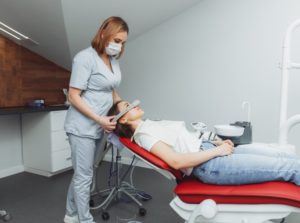
If you hesitate to schedule dental appointments because you are nervous about receiving treatment, you may be thinking about choosing a practice that offers nitrous oxide sedation. After all, it can help you relax and doesn’t involve needles. Seems like a good deal, right? Still, you might wonder if nitrous oxide is safe. The good news is that for the vast majority of patients, this form of sedation poses little-to-no risk. Read on to learn more from a pediatric dentist in Duncanville about it and its safety considerations.
A Brief History of Nitrous Oxide
Nitrous oxide was discovered hundreds of years ago and has been used in medical and dental settings since the 1800s. In the early days of its usage, nitrous oxide required trial and error before dentists learned how to administer it properly. Today, however, techniques and regulations have been refined, making nitrous oxide one of the safest ways to promote relaxation and calmness during dental procedures.
What Safety Measures Do Dentists Take?
Dentists are trained to administer nitrous oxide safely. Some of the precautions they take include:
- Learning about a patient’s medical history and allergies. This helps dentists identify any risk factors that might lead to a negative reaction to nitrous oxide. For example, it is not generally recommended during pregnancy.
- Making sure enough oxygen is utilized. Nitrous oxide is not used by itself in dentistry. It is mixed with oxygen to minimize the risk of negative side effects.
- Carefully monitoring patients. During your treatment, your dental team will keep a close eye on you. If you begin to exhibit signs of a negative reaction to sedation, they will take immediate action to help you.
What Are the Risks?
Nitrous oxide is a very low-risk form of sedation when it is administered by a trained medical professional. Some patients experience mild side effects, such as nausea and a headache, but those tend to wear off fairly quickly. If you must regularly use nitrous oxide, it’s possible that a vitamin B12 deficiency could develop, but that can be addressed via proper use of supplements. Allergies to nitrous oxide are rare, but they can cause people to experience hives, difficulty breathing, and fever.
If you ever hear any “horror stories” about nitrous oxide, understand they are usually the result of recreational users not taking proper precautions. Overdoses of nitrous oxide can be dangerous, but they are virtually nonexistent in medical and dental settings.
Does going to the dentist make you nervous? Ask your dental team if nitrous oxide sedation is available; it is a safe and effective way to get through treatments with as little stress as possible.
About the Author
Dr. Donna Barefield has been working for the smiles of patients in the Duncanville area for four decades. After earning her dental doctorate from Baylor University, she continued her studies and is now a Diplomate of the American Academy of Pediatric Dentistry. Dr. Barefield is also a member of the American Dental Association. She offers nitrous oxide, oral conscious sedation, or general anesthesia. To learn more, you can schedule a consultation for your child on her website or call (972) 298-7560.
